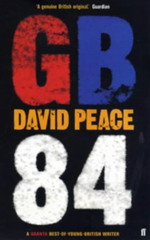
I did for a long time steer clear of both these writers. Naturally I have been dimly aware of Peace’s Red Riding Quartet, but never felt tempted to turn a page somehow suspecting he was a Yorkshire James Ellroy. And I have always found Ellroy’s words unpleasantly unreadable, which I suppose for some is the appeal. But the theme of GB84 seemed to strike a chord, and I admired the bravery of someone willing to take on the misery and madness of the miners’ strike and turn it into a great work of art, while acknowledging Wah!’s A Word To The Wise Guy and Zola’s Germinal.
Timing is important in art, and of course it’s no coincidence that we are 20 years on from this epic and epoch-defining struggle. And the tremors are still being felt, as our transport minister faces the repercussions of hastily shredding papers on hearing of the death of a taxi driver in South Wales half a lifetime ago. So a nice juicy entertaining tome to celebrate the twentieth anniversary of the struggle that surely changed this country forever seems about right. But it works. It’s an absorbing and deeply moving manuscript, more in keeping with John Le Carre than owt else, with its web and weft of power, corruption and lies. And all the better for that. No one is right about everything, nothing is all it seems, and there are always ulterior motives which have unknown but far reaching consequences.
Oddly almost the only event of the 1980s not mentioned in Arnott’s truecrime is the miners’ strike. Interesting point. But then Arnott is a London writer, but there were plenty of people making hay out of the strike down here, putting on profitable gigs and the like. As for Arnott, again one could hardly miss his first two books, The Long Firm and He Kills Coppers, but I wasn’t interested. I wasn’t interested that is until I saw that edition of Time Out Arnott edited, and his interview with Morrissey. This challenged my preconceptions enough to get me to read The Long Firm, and to then concede it was a compelling crime caper. Arnott instilled a dead end genre with a certain something the great pulp writers like Jim Thompson, David Goodis, Ross McDonald, Charles Willeford, through to Jim Sallis have done. And sometimes that’s just down to unexpected reference points and attention to detail as much as subverting stereotypes. Unexpectedly Arnott’s got a deft touch.
And I’m sure the interview with Morrissey was no coincidence. They seem to share an unhealthy and irresistible obsession with the distorted and refracted glamour and iconography of the refractory and fractious. Morrissey’s work is riddled with this nonsense, and Arnott twists the prism in a new way to make us look again at the Soho and East End underworld. Whatever you may think, the appeal is evident, and Arnott in his books infuses the pages with layer upon layer of internal wrangles about whether to be charmed or chilled by the very subject matter he has as his muse.
And this all gets very complicated in truecrime. It is a terrific book, and in its way a story of the ‘80s and ‘90s in a way Jonathan Coe could be proud of. His points of reference are odd, clumsy and unhealthy perhaps, but effective. And he plays with mirrors, mocking the strangeness of his own success, weaving in the absurdities of the sub-Reservoir Dogs Guy Ritchie type gangster films, the rise of the lads magazine, the arch villain as celebrity, acid house and the gentrification of the rave culture, and the like. And underneath is a sadness at the passing of the supposed honour-amongst-thugs society and the descent of decent villains into the drugs trade rather than good old honest porn and enforcement. Well, we all have our romantic notions …
“And the east-end rogue you so admire is a murdering fuckhead …” sings Gravenhurst (or Nick Talbot) on the rather beautiful Flashlight Seasons, and this record has provided much of the backdrop to my summertime reading. And it seems an appropriately grainy and beautiful English soundtrack for a breezy week spent soaking up words. Again, if this record were not on the ever dependable Warp I might have passed it by. I am consistently disappointed by records heralded as sparse, intimate careful whispers of despair and melancholy, with all the right references. So I was very wary of Gravenhurst, and might have passed it by had someone not linked it back to 'Back To The Old House' and 'Girl Afraid', two of the (too) few Morrissey moments I can bear.
Thankfully I gave it a whirl. It’s a lovely record, and should ideally be on Transatlantic along with a host of other English troubadours and their songs of special beauty. It does however take me back to a pre-Smiths summer, with the murmur of Michael Head, and Ben Watt’s collaboration with Robert Wyatt on the Summer Into Winter EP, when it was an act of rebellion to draw up a stool and defy expectations with an acoustic guitar. Those people built some important bridges for others to cross over. And they sang some lovely songs. But nothing as lovely as some of those on the invaluable Barbara Acklin and Tyrone Davis collections just salvaged by the very on-the-ball Edsel label. Don’t miss out!
© 2004 John Carney